The ruling was welcomed by the Electronic Frontier Foundation, which has argued for years that the vaguely worded statute needs to be clarified.
“EFF has long fought to reform vague, dangerous computer crime laws like the CFAA,” said EFF Senior Staff Attorney Andrew Crocker in a statement to The Register. "We’re gratified that the Supreme Court acknowledged that overbroad application of the CFAA risks turning nearly any user of the Internet into a criminal based on arbitrary terms of service.
“We remember the tragic and unjust results of the CFAA’s misuse, such as the death of Aaron Swartz, and we will continue to fight to ensure that computer crime laws no longer chill security research, journalism, and other novel and interoperable uses of technology that ultimately benefit all of us.”



from the majority opinion (written by barrett):